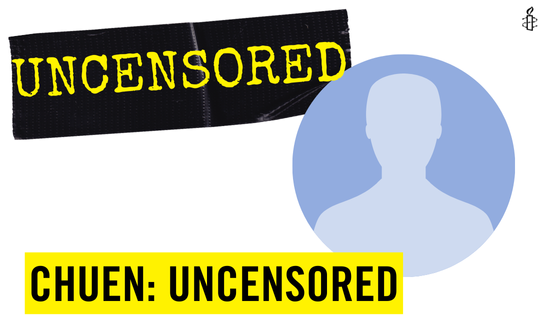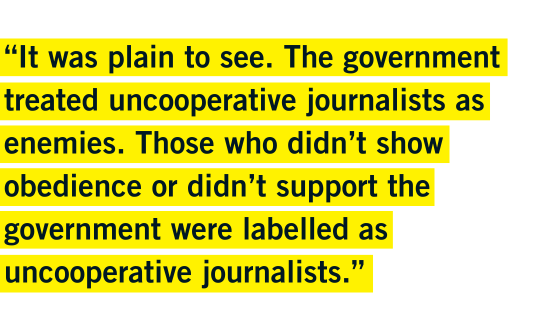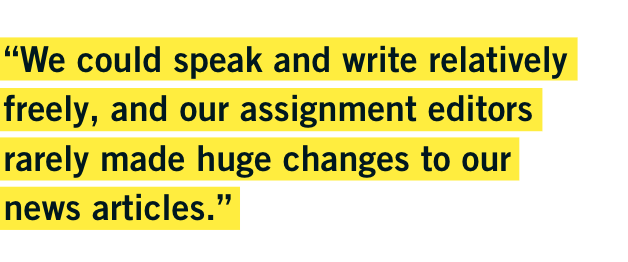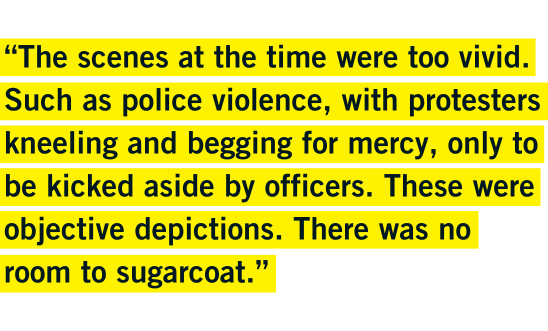
"Chuen": Uncensored

You can read the original Traditional Chinese version of this interview HERE.
"Chuen": Former Hong Kong Journalist
Chuen (pseudonym) was on the frontline reporting on the citywide protests against the extradition law amendment bill in 2019 and 2020. With his pen and his camera, he documented how the police used force against the protesters and besieged a university.
However, as the protests escalated and the National Security Law was enacted in June 2020, Chuen faced severe censorship and institutional pressure within his media organisation. Disheartened by the shrinking press freedom in Hong Kong and increasingly worried about the unpredictable legal risks, he finally quitted journalism, giving up what he once dreamed to be his lifelong profession.
His story illustrates how the chilling effects of political “red lines” impact press freedom and the public's right to know.

Translated Interview in English:
Press freedom crushed by the National Security Law Hong Kong journalist: “I was naive to dream I could be a journalist for life”
Chuen (pseudonym) had been a journalist for a few years when the Anti-Extradition Law Amendment Bill (hereafter Anti-ELAB) protests broke out in 2019. He recalled that in the early and mid-stages of the movement, journalists enjoyed quite a lot of freedom to report on the protests and there was huge room for professional discretion.
“At that time, on the main pages (of newspapers), we could still write about the protests at length from different perspectives, including the demands of the protesters, how the demonstrations went, and even how the police enforced the law. We could speak and write relatively freely, and our assignment editors rarely made huge changes to our news articles.”
Despite the increasingly polarised social atmosphere, Chuen tried his best to balance the views of people with different political stances and report on their different events. Whether it was the “Anti-Extradition Law March” or “Support the Police Rally”, he would do his utmost to report on it if his manager tasked him with the assignment.
Even minor incidents that occurred during a social movement could spark a journalist’s sense of purpose. He recalled covering a story about a civil society group applying for the “notice of no objection” from the Police to organise a protest. After their application was rejected and subsequently denied on appeal, it meant anyone participating in the march would risk joining an illegal protest. He felt a responsibility to present the facts and arguments from both sides in his reporting, leaving it to the readers to discern right from wrong.

“My duties as a journalist allowed me to inform the public that someone had tried to apply for an no objection to the protest, but was turned down by the authority. Through my writing, I could explain the reasons and the process of how the organiser made the application, police’s rationale for a refusal, and thus providing an opportunity for the public to decide independently – on whether they stood by the political stance of the protest organiser, and allowing them to assess the risks of participating in the protest.”
Chuen admitted he has his own strong political convictions, but as a journalist, he constantly reminded himself to stay objective when he was reporting. “The scenes at the time were too vivid. Such as police violence, with protesters kneeling and begging for mercy, only to be kicked aside by officers. These were objective depictions. There was no room to sugarcoat.” he said.
With his pen and his camera, he documented things that happened during the protests, providing the public with enough evidence to have their own views. “I believe many events were so clear and visible from their start to finish that the public could form their own judgments and discern right from wrong.” He believed the Anti-ELAB protests was the time in his career when he most fully realised the value as a journalist. Five years on, looking back at how he once “wrote whatever he wanted”, it now feels almost like a fantasy.
The siege of the PolyU: a turning point after which news drafts were censored and altered beyond recognition
Since June 2019, demonstrations against the extradition law emerged in different districts across Hong Kong. In November, a large-scale police standoff broke out at the Hong Kong Polytechnic University (PolyU) which lasted several days. The riot police besieged the university and trapped many protesters on the campus.

Chuen said the siege of the PolyU was a turning point for press freedom. At that time, the Metro station closed early, with train services suspended as early as 10 pm. The government advised the public to stay at home and declared the incident a “riot” and protesters who were involved were labelled as “rioters”. Chuen’s media agency also started giving “gentle reminders” to its staff. His editor repeatedly reminded him to include the government’s public appeal in his reporting. Although he was somewhat displeased, he initially thought it was no big deal.
It wasn’t until later, when he was assigned to report on the protesters trapped at PolyU, he discovered that the final published version was significantly different from his original news draft. “In my draft, I consistently referred to the people involved as ‘protesters’, but in the final published article, the wording had all been changed to ‘rioters’. The views and criticisms on the protests expressed by the Hong Kong government and the Liaison Office of the Central Government were all moved to the opening paragraphs, completely changing the tone of the article!” He emphasised that those word choices were not his own, and the changed tone was against his original intention of writing the article.
Chuen tried to express his discontent to the editor. “The editor said someone ‘from higher up’ reminded them that the government had already defined the incident and it was irrefutable, so there was no room for the editor to object.” Nonetheless, Chuen was conscious to uphold his principles, so there were a few times when he secretly edited the online articles after they were published. “Especially those articles that were posted on our online news platform, when no one was watching I discreetly made as many changes as possible on the platform.”
National Security Law ended the Apple Daily, pushing journalism to the verge of despair
In August 2020, two months after the National Security Law came into force, the Hong Kong police raided the headquarters of Next Digital Ltd and arrested several senior executives of Apple Daily, including its founder, Jimmy Lai. Chuen described the police’s action as a warning shot, also the last straw that crushed the resilience of local journalist sector. “It was plain to see. The government treated uncooperative journalists as enemies. Those who didn’t show obedience or didn’t support the government were labelled as uncooperative journalists.”
After the National Security Law was implemented, all the planned feature stories for the first anniversary of Anti-ELAB protests were shelved. Many civil society organisations and groups disbanded afterwards. However, Chuen noticed that very few journalists working for mainstream media did follow-up interviews with those affected. “Maybe after seeing what happened to Apple Daily, everyone was scared.” He tried to work on news stories featuring politically sensitive individuals, but was ordered to stop midway through the production. He managed to complete some reporting, but those contents were removed from online shortly after they were published. For security reasons, he could not reveal the details of those news contents, but he remembered what the editor told him: “because those ‘higher up’ don’t like it.”
Chuen said, punishing journalists or dissidents should not happen in any civilised society. “No civilised society would jail people who promote freedom, disagree with the authority, or resist indiscriminate violence. No matter how much the government claims Hong Kong still has sound institutions, a robust financial system and international events, I think it’s all bullshit.”
He said with resignation that no one dare to speak out anymore. Hong Kong has become so absurd that even the journalist sector is losing those who are willing to tell the truth.
After press freedom was stifled, he quitted journalism to live “a life of quiet endurance”
Chuen didn’t complain to his manager, as he understood that editors were under pressure too, forced to go against their conscience. “Even mentally strong people may not endure a blow like that.” He made several attempts to write politically sensitive news stories, but all of them were either removed from online or rewritten. At that time when he met with other journalists, he sensed that “everyone was utterly deflated”. He knew his experience was not an isolated case. Within two years after the enactment of the National Security Law, several independent media outlets shut down, including Stand News and Citizen News. Initium Media had decided to move its headquarters from Hong Kong to Singapore. The entire media industry shrunk with deteriorating press freedom.
In Hong Kong, fresh grads who become journalists earn only around HK$14,000-15,000 (equivalent to £1350-1450) per month, with minimal annual pay rise. Chuen said very firmly that no one becomes a journalist for the money; those who want to earn money will never do this job. “It’s all our passion that compensates for the little monetary gain” he said.
However, after the National Security Law took into effect, the “red lines” became so vague that no one knew where the boundaries were, what topics couldn’t be touched upon, and which person couldn’t be interviewed. “Maybe I shouldn't bear the risk of imprisonment for such a meagre salary. In Hong Kong, journalists going to jail is a real possibility!” After struggling and persisting for another two years, he finally decided to quit journalism.
Chuen said “I was naive to dream I could be a journalist for life”, but now he has resigned from the media industry. Although he has chosen to stay in Hong Kong, he said he is just living “a life of quiet endurance in humiliation”.
“Perhaps I still have many aspirations, many news stories I hope to work on... even after I quitted journalism, these ideas still flash across my mind from time to time. But in the current political climate, I can only keep these ideals buried deep in my heart.” Chuen said he believes every dark tunnel has an end, but sadly no one knows how far away that end might be.
Original Interview in Traditional Chinese:
新聞自由被《國安法》折磨並擊倒 香港記者阿全:「曾妄想一世做記者」
「反修例運動」初期仍能自由報道 記者生涯中的高光時刻
阿全(化名)入職記者數年後便經歷2019年「反修例示威」,他認為在運動的前、中期,新聞自由度頗高,工作上發揮空間亦相當大,「當時在主要版面,仍然可以用較大篇幅描寫不同角度的主流內容,包括示威者的訴求、示威情況,甚至警察執法的過程,算是能夠暢所欲言,採主(編採主任)甚少大改。」即使社會氣氛因示威運動逐漸變得兩極化,阿全亦盡量平衡不同政見人士的意見及相關活動,不論是「反修例大遊行」,還是「撐警集會」,只要是上司交給他的,他都會盡力採訪。
即使是在社會運動期間發生的一些小事,都能激發記者的使命感。阿全憶述其中一單採訪,是一個民間組織就舉辦遊行向警方申請《不反對通知書》,申請被拒後轉到上訴委員會,同樣不獲批,意味著任何人參與該遊行即屬違法。他自覺有需要在自己的報道反映事實以及正反雙方的理據,再由讀者辨別是非。「我的職責賦予我機會,告知公眾有人曾經申請遊行但不成功,透過我的文字解釋申請的原因及經過,加上警方反對的理由,再由公眾自行決定是否同意該主辦方的政治立場,及衡量參與示威的風險。」
阿全承認自己有強烈的政治立場,但他自問在工作期間一直保持著客觀的報導態度,「當時的畫面太鮮明,例如涉及警方的暴力場面,有示威者跪地求饒,卻被警方一腳踹開,都是客觀的畫面描述,根本沒有空間讓我美化。」他利用自己的筆和鏡頭紀錄示威期間發生過的事,為公眾提供足夠的證據支持自己的立場。「我認為許多事的發生經過和結果都非常清晰,公眾可以自行評價,分辨是非黑白。」
阿全認為,「反修例運動」期間,是他在記者生涯中最能發揮新聞工作者價值的一段時期。五年過去,回想起當時「想寫咩就寫咩」,他頓覺有點天方夜譚。
理大一役成轉捩點 新聞初稿被改至無目全非
「反修例運動」於2019年6月掀起序幕,示威集會一直在香港各區發生。同年11月於香港理工大學(理大)發生持續數天的大型警民衝突,示威者被警察圍困在校園內。阿全指理大事件是新聞自由的轉捩點。他憶述,事件發生期間港鐵提早暫停服務,晚上10點已經停駛;政府提醒市民不要外出,更將事件定性為「暴動」,示威者則被定義為「暴徒」。他所屬的傳媒機構亦開始向員工發出「溫馨提示」。
採訪主任曾多次提示阿全要引述政府的呼籲,雖然他有點不悅,但起初仍覺得無傷大雅。直到有一次,他負責報道理大示威者被圍堵的情況,其後卻發現最後刊登的版本與自己的初稿差距甚大,「我在文章中一直用指稱『示威者』,但在最終發佈的文章中,所有字眼都被改為『暴徒』;香港政府和中聯辦對事件的看法、對示威者的批評,通通被調到文章的首段,內容完全變了調!」他強調,這些用字並非出自他手,已變調的內容亦不是他的原意。
阿全表示,自己曾嘗試向採主提出不滿,「採主解釋有『更高層人士』提醒,官方已對事件定義,因此無可置疑,我也無法反駁。」但他仍然有意識堅持自己的底線,多次靜悄悄地再修改文章,「尤其是刊登在公司網站的文章,我趁沒人發現便在系統上修改,能改多少便改多少。」
國安大法令《蘋果》停運 猶如推傳媒入絕境
2020年8月,《港區國安法》實施後兩個月,警方進入《壹傳媒》大樓搜證,拘捕包括創辦人黎智英等《蘋果日報》多名高層。阿全形容警方的行動猶如殺雞儆猴,壓倒了新聞界繼續堅持的最後一根稻草。「這是眼見的事實,政府將不友好的記者視為敵人,不乖乖聽話或不擁護政府的一律視為不友好的記者。」
《國安法》實施後,原定計劃製作「反修例運動」一周年的專題故事,全都沒有下文。很多民間組織及團體先後解散,但阿全發現主流媒體沒有太多記者為受影響的人做跟進報道,「見到《蘋果》遭如此對待,可能大家都怕了」。他曾經嘗試製作政治敏感人士的新聞故事,製作期間收到上級指示要求停止;亦有已完成製作的新聞報道,在刊登後短時間內被強行下架。基於個人安全理由,阿全無法詳細透露報道內容,只說採主遺下一句「因為上面唔鍾意」。
他指,處罰記者或異見人士並非文明社會應有的事,「文明社會絕不會將提倡自由的人、和政權持不同意見的人、抵抗無差別襲擊的人送到監牢,即使政府現在如何聲稱香港尚有良好制度、穩健金融、國際盛事等,我認為全是廢話。」他無奈的說,沒有人再敢挑釁或批評,香港變得如此荒謬,連新聞界都逐漸失去說真話的人。
新聞空間收窄至無法喘息 無奈退出傳媒界「忍辱偷生」
阿全沒有對上司抱怨,他明白採主同樣受壓,同樣做著違背良心的事,「即使是心理健康的人,遭受一次如此打擊,怕且都會捱不住。」他之後多次嘗試製作政治敏感的報道,同樣被下架或被改寫。他形容當時與行家見面,感覺到大家「個個都頹」,他就知道自己面對的絕非單一例子。《國安法》實施後的兩年間,《端傳媒》撤出香港,《立場新聞》和《眾新聞》等多個媒體宣布解散,新聞行業和新聞自由一同萎縮。
在香港,剛畢業的傳統媒體記者入職月薪約只有港幣一萬四至一萬五,每年加薪幅度微薄。阿全語氣肯定地說,想賺錢的人絕對不會入行做記者,「全憑熱情搭救」。惟《國安法》實施後「紅線」模糊,無人能清楚知道政府對新聞報道的底線在哪,哪些議題不能觸及、哪些人物不能訪問等,「或許我不應該為了真的非常微薄的薪金,而令自己面臨牢獄之災。香港記者入獄是會發生的事!」約莫堅持了兩年後,他最終決定轉行。
阿全曾經「妄想一世做記者」,如今卻已離開傳媒界。雖然他堅持留在香港,但他形容自己只是在這座城市中「忍辱偷生」,「或許我還有很多抱負,很多想做的故事,即使在離開行業後仍會不時在腦海閃過這些念頭,但在目前的環境只能將這些理想藏於心底。」他相信黑暗的隧道總有盡頭,但終點有多遠卻無人知曉。